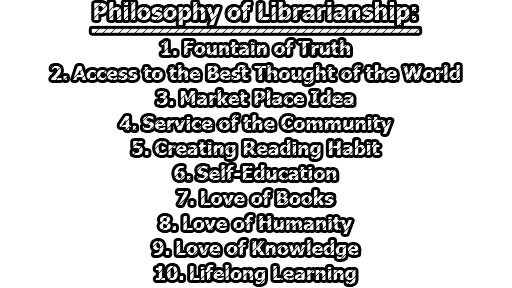Philosophy of Librarianship:
The Philosophy of Librarianship refers to the underlying principles and values that guide the profession of librarianship. It is a framework that provides direction to librarians in their work and helps them to understand the broader significance of their role in society. Some of the key statements of the Philosophy of Librarianship are given below:
- Fountain of Truth: Libraries are seen as a reliable source of information and knowledge, providing a trustworthy foundation for lifelong learning.
- Access to the Best Thought of the World: Librarianship believes in the importance of providing access to a wide range of information and knowledge from all parts of the world, in order to broaden people’s horizons.
- Market Place Idea: A library is a place where ideas and information are exchanged, and people are free to access information from a variety of sources, without judgment or bias.
- Service of the Community: Librarianship is committed to serving the needs of the community, understanding the unique needs and interests of its users, and tailoring services to meet those needs.
- Creating Reading Habit: Librarianship promotes a love of reading and encourages people to read widely and critically, to develop their analytical and creative thinking skills.
- Self-Education: Libraries are seen as a place for self-education, where people can pursue their interests and acquire new knowledge and skills at their own pace.
- Love of Books: Librarianship values books as an important medium for the transmission of knowledge and ideas, and sees them as an essential part of a well-rounded education.
- Love of Humanity: The Philosophy of Librarianship is grounded in a love of humanity, recognizing the importance of providing access to information and knowledge to all members of society, regardless of their background or socioeconomic status.
- Love of Knowledge: Librarianship values the pursuit of knowledge and sees it as a lifelong endeavor, with the library playing a key role in facilitating that pursuit.
- Lifelong Learning: Librarianship recognizes the importance of lifelong learning and encourages people to continue to seek out new information and knowledge throughout their lives.
In conclusion, the philosophy of librarianship is a set of guiding principles that underpin the role of libraries and librarians in society. It emphasizes the importance of access to information and knowledge, the preservation of cultural heritage, and the promotion of intellectual freedom and privacy. The philosophy of librarianship is built on a commitment to service, to providing equitable access to information and resources, and to supporting lifelong learning.

Library Lecturer at Nurul Amin Degree College










